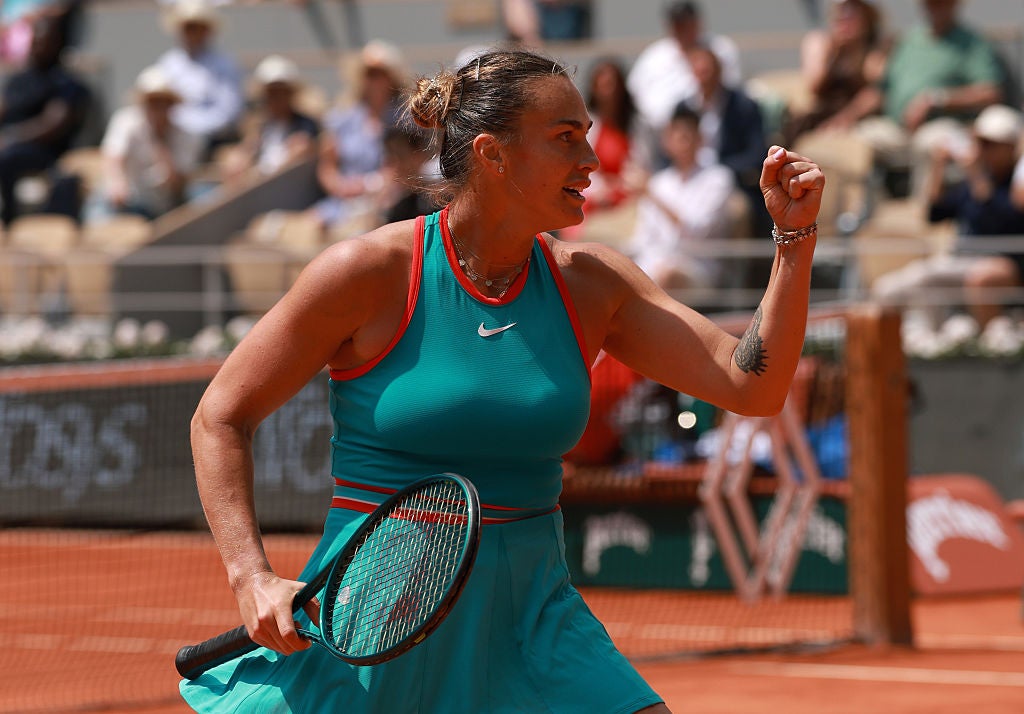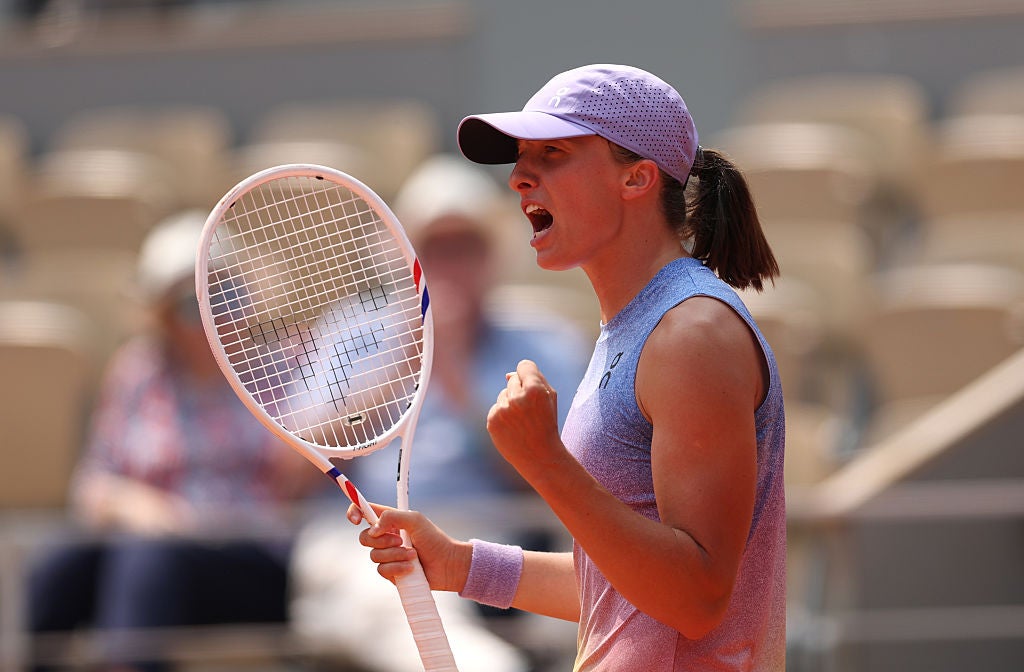The TikTok dance and irony at heart of Iga Swiatek and Aryna Sabalenka’s rivalry
As Swiatek and Sabalenka meet in the French Open semi-finals, Roland Garros has a blockbuster clash that will demand the big stage

The match-up the French Open had been waiting for came before the tournament began: Iga Swiatek and Aryna Sabalenka, the two rivals who have grappled over the World No 1 position for the past three years, met on the practice courts at Roland Garros and played a set. Two weeks later, they will meet again in the semi-finals, a blockbuster booked between the defending champion Swiatek and the biggest contender for her throne, the top seed Sabalenka. With eight grand slam titles between them, it will be the first time they have met at this level since the 2022 US Open.
Swiatek, who has five of those grand slam titles to Sabalenka’s three, kept her cards close to her chest when discussing their practice session on the eve of Roland Garros. Sabalenka was more revealing as she opened up on their relationship and how it had become warmer since collaborating on a TikTok at last year’s WTA Finals in Riyadh. It had been icy. “Before it wasn't any communication, any practices with her,” Sabalenka said. “But now we are getting better, we get along better, and we practice more often. We know each other quite well.”
The timing of the TikTok in question, which saw Sabalenka and Swiatek dance on court before cutting to a behind-the scenes shot of the glamourous WTA Finals photoshoot, came when Sabalenka was in the ascendency. She had added the US Open to her two Australian Open titles and reclaimed the No 1 ranking from Swiatek. “We've had a lot of great battles in the past,” Sabalenka said. The majority have come when Swiatek has been on top and Sabalenka has been chasing.
.jpeg)
Swiatek has tended to win them, too. The 24-year-old is the only player in the world’s top 10 to boast a winning record against Sabalenka, defeating the Belarusian in eight of their 12 meetings. That includes their classic Madrid Open final in 2024, a three-hour, 11-minute epic on the clay won by Swiatek 7-5 4-6 7-6 (7) - in a contest that was later named the WTA’s match of the year. Swiatek consolidated that victory with another win over Sabalenka in the Rome final before winning her third straight Roland Garros title, her supremacy on clay undisputed.
It has felt different in 2025, given the doubts over Swiatek’s form coming into Roland Garros. Swiatek has not won a title or reached a final since last year’s French Open and, in her absence, Sabalenka marched back to Madrid and reclaimed the title by defeating Coco Gauff in the final. The 27-year-old is well positioned to contend for Roland Garros and the mental transformation Sabalenka underwent to win her first grand slam title in Australia in 2023 came after Swiatek’s win over her in the US Open semi-finals. She is a different player now.

Sabalenka can overpower and dominate the rest of the field to the extent that her consistency and reliability across all surfaces is underappreciated. This year’s French Open has been a typical tournament for the new Sabalenka, reaching the quarter-finals without dropping a set. Her victory over Zheng marked her 10th consecutive grand slam in which she has reached the quarter-finals, discounting the Wimbledon missed last summer due to injury. “They are crazy stats,” Sabalenka said. They are becoming normal.
As is Swiatek’s record in Paris, with the Pole extending her winning streak at Roland Garros to 26 wins in a row after overcoming Elina Svitolina in the quarter-finals. Chris Evert’s record of 29 straight wins is in sight. More and more, it seems as if the defining result of Swiatek’s week may be her comeback against Elena Rybakina in the fourth round, winning in three and after being a set and a break down early in the second. “I think I needed that kind of win,” she said at the time. Swiatek found how to win when it wasn’t going her way.
The four-time French Open champion will need that spirit when he faces Sabalenka, given her tendency to start quickly and establish control in the match by attacking any second serves. It’s rare for Swiatek to have a target when she takes to Philippe-Chatrier, given her record there, but playing the World No 1 gives her one. “I don’t know if she elevates my game but for sure our rivalry is pushing both of us,” Swiatek said. “It’s not only about the level of tennis. It's about everything, how we work, and how professional we are.”

And this is a semi-final that can elevate the French Open, too. The controversy over unequal scheduling between men’s and women’s tournaments has continued this year, with organisers doubling down on their decision to schedule men’s matches in the primetime slot, leaving the women with the earlier starts. On Wednesday, Sabalenka faced Olympic champion Qinwen Zheng in a high-quality quarter-final that started at 11am and in front of thousands of empty seats.
“I definitely agree that we deserve to be put in a bigger stage,” Sabalenka said when pushed on the inequality of the scheduling. “Better timing, more people watching.”
There will perhaps be an irony to the fact that the French Open gets to stage the rivalry that the rest of the grand slams have been waiting years to see.
Join our commenting forum
Join thought-provoking conversations, follow other Independent readers and see their replies
Comments